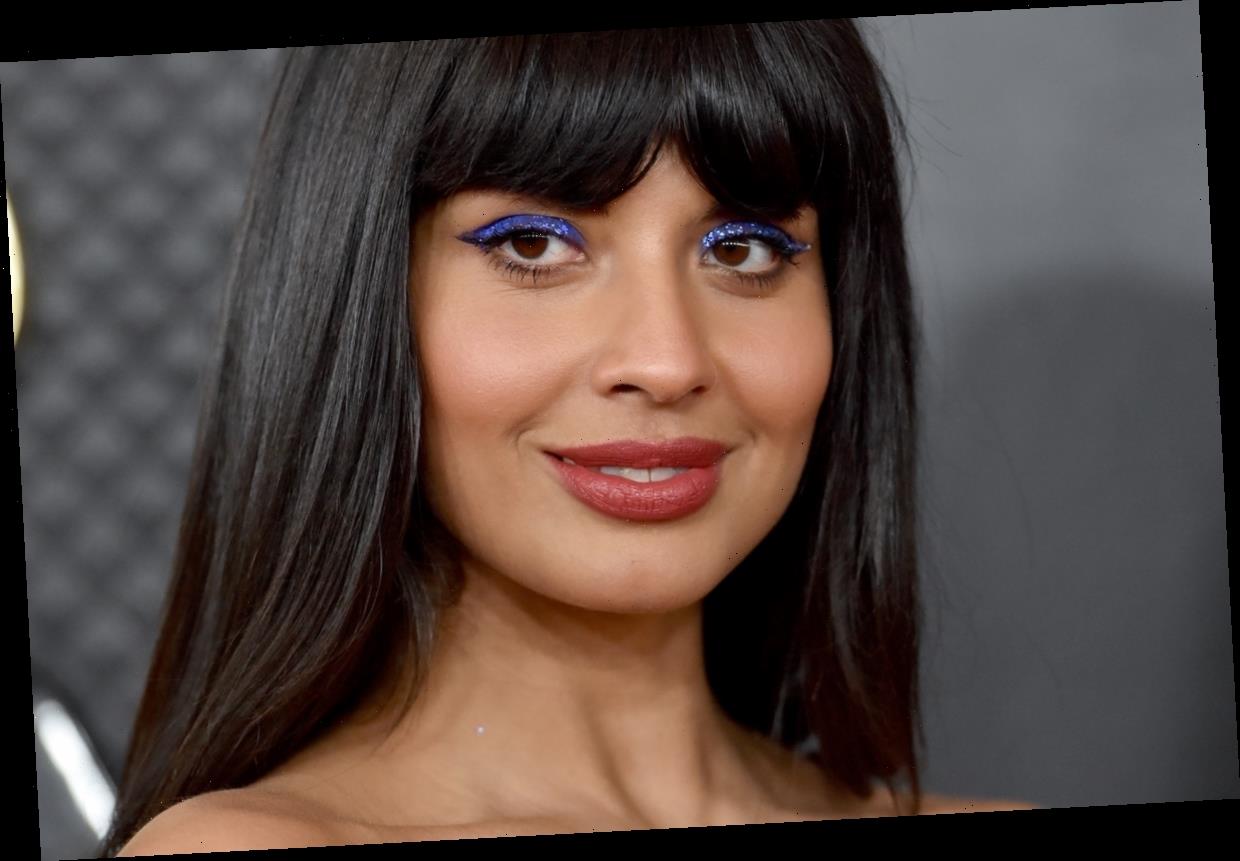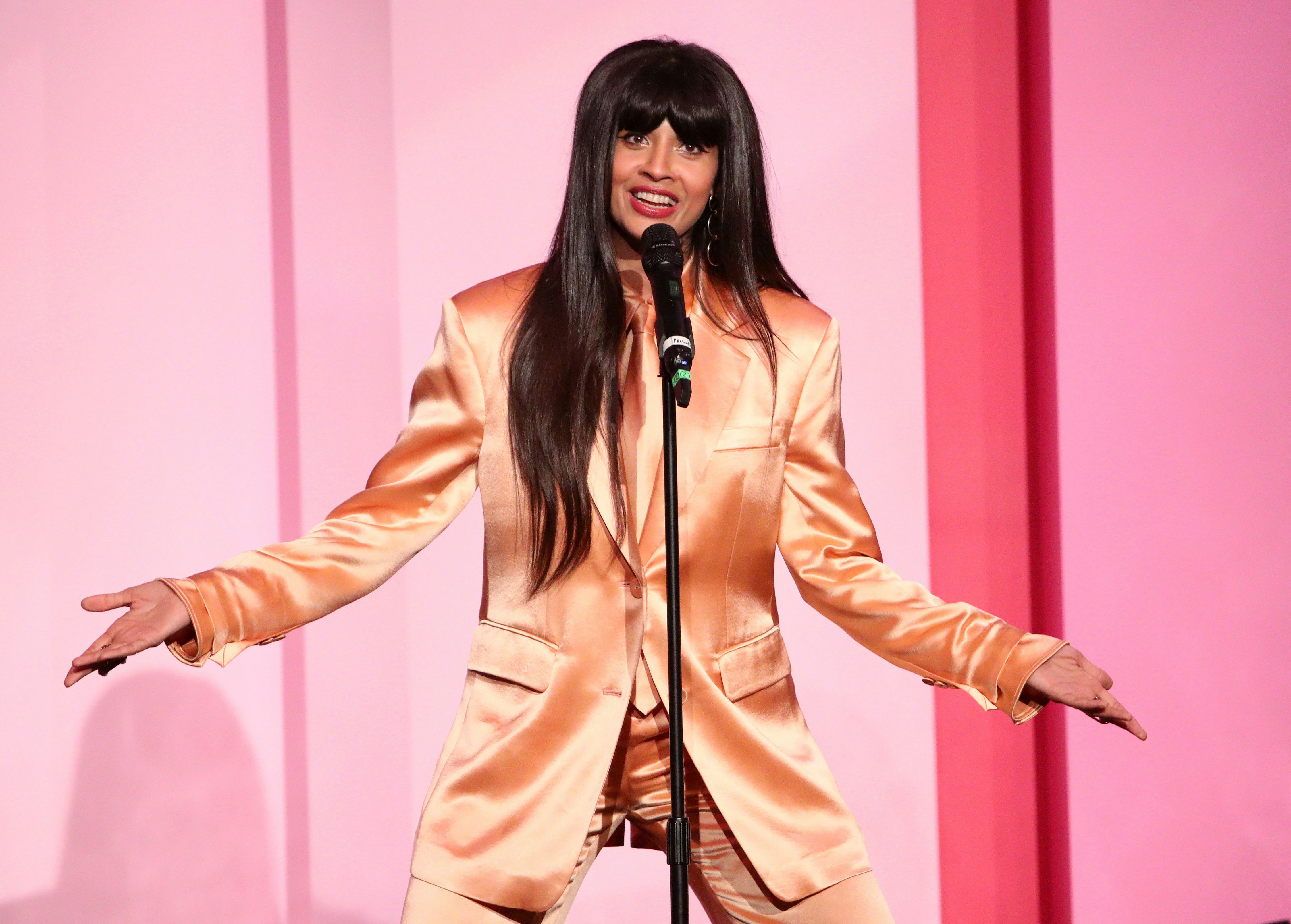On the heels of the controversy surrounding her role in HBO’s Legendary, actor Jameela Jamil has made one thing perfectly clear: You don’t have to come out for your queer identity to be valid. On Feb. 5, Jameela Jamil came out on Twitter as queer, sharing, "I never officially came out as queer. I added a rainbow to my name when I felt ready a few years ago, as it’s not easy within the south Asian community to be accepted." The announcement was the first time Jamil has shared her sexual identity with the public.
In the three-page statement, Jamil addressed Twitter users’ response to the announcement that Jamil would be joining the cast of Legendary, HBO Max’s upcoming unscripted vogueing show. After a Feb. 4 press release, which stated that "Jamil would MC and judge" the show, the actor received backlash for her involvement, as she admits she lacks experience within drag ball culture, an LBTQ+ subculture rooted in the black and Latinx trans and queer communities, in which attendees dance, vogue, walk, and pose for prizes and recognition.
"I know that my being queer doesn’t qualify me as ballroom," Jamil wrote. "But I have privilege, and power, and a large following to bring to this show."
While the commercialization of ball culture is indeed problematic, as actor has no history of involvement with ballrooms, it’s important to recognize the significance of Jamil’s tweet. While she can (and ultimately did) choose to use her platform to open up about her queerness, Jamil didn’t need to come out in a public forum to be validated as a queer person. Her identity isn’t contingent on its visibility, and her sexuality is not up for debate. In fact, no queer person’s is.
Though some queer people may be open and excited to share their identity with the world, not all feel comfortable or even safe coming out. And whether you keep your identity to yourself, or tell your best friend, your partner, the only gay person you knew as a child, or your one million Twitter followers, your identity is valid.
For Chris Bright, director of public training for The Trevor Project, every queer person needs to figure out what feels right for them, and what actions make them feel safe and comfortable in their coming out process. "I might decide that [being "out"] just doesn’t feel safe or comfortable in a particular community where I am," Bright tells Elite Daily. "That doesn’t mean I’m less authentic, or I’m not myself; it just means that I’m the one who calls the play, and I’m the one who makes it work."
From adding a rainbow emoji to her name on Twitter to answering "straight-up" questions about her identity, Jamil has expressed and navigated her queerness in the ways that felt right for her. And though she ultimately decided to share her identity publicly, it’s important to remember that Jamil (like all queer people) did not owe anyone an explanation or "coming out" statement, nor is she "queerer" now that she is publicly out.
In her Twitter statement, Jamil described the intersection of her identities, which provided more context to her thought process behind her decision not come out. "I didn’t come from a family with *anyone* openly out," Jamil wrote.
In addition to the lack of queer representation and support she had growing up, the actor also expressed her fear of being called fake or inauthentic in her coming out, especially in response to the backlash of Legendary. "I was scared of the pain of being accused of performative bandwagon jumping over something that caused me a lot of confusion, fear, and turmoil when I was a kid."
As a queer person, I can personally attest to the "damned if you do, damned if you don’t" mentality that can accompany coming out. On the one hand, I wanted to make and hold space for other queer people, to create the representation I never saw as a child. But on the other, I was concerned about risking my personal safety and well-being, taking care of my mental health, and dealing with a seemingly endless wave of criticism for being too queer or not queer enough.
Coming out is a difficult decision, and no queer person, including Jamil, should be robbed of making it. Since Jamil shared that a Twitter statement was "absolutely not how [she] wanted to come out," it’s crucial that we examine the pressure we put on all people to define their identity. No human being owes the public — whether that means their family, or their followers — these answers. And while coming out can be an empowering way to express yourself or use your platform, no one (including celebrities) needs to come out to be validated in their identity. (Cue absolute icons Ashley Benson, who has never made a public statement about her sexuality, or actor Tessa Thompson, who told Porter, "[In my family] you can be anything you want to be. If I bring a woman home, [or] a man, we don’t even have to have the discussion.")
If you’re thinking about coming out or wondering how to navigate your queerness, Bright emphasizes that you are in the driver’s seat. You get to call the shots and express yourself in whatever way you see fit, from a social statement to bringing your boo home for dinner. "[Tell yourself:] ‘I know my needs and situation better than anyone else. I will move the mark or change the boundaries when it feels right to do that, but I’m not going to do it before then,’" Bright says.
Though "coming out" or opening up about your queer identity can be a monumental step, it’s certainly not the determining factor of being a queer. Jameela Jamil has been queer for as long as she’s identified as queer, and will continue to be queer for as long as she continues to identify that way — regardless of who knows or who she’s dating.
Sources:
Chris Bright, director of public training for The Trevor Project
Source: Read Full Article


